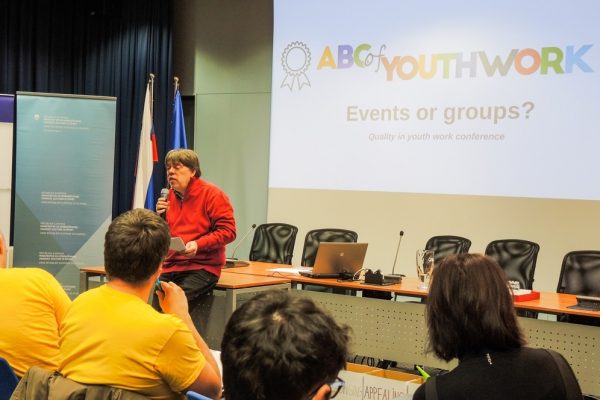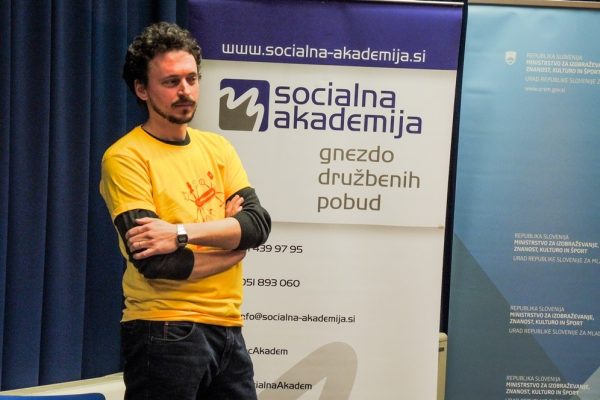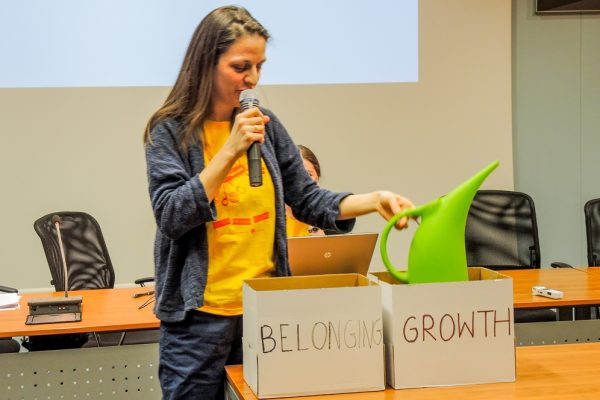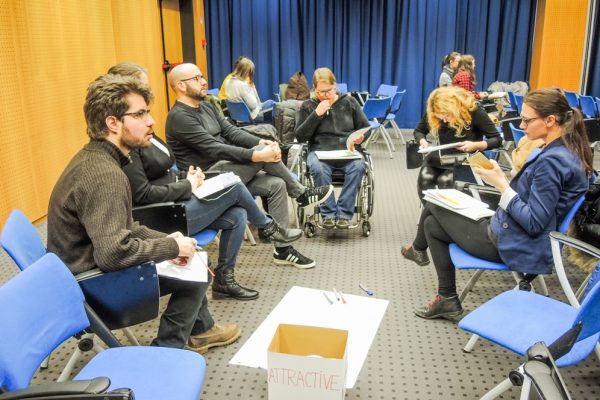On Thursday, the 1. of March, the project partners organized a final conference of the ABC of Youth work project entitled Events or groups? in cooperation with the Office of the Republic of Slovenia for Youth in the premises of the Ministry of the Republic of Slovenia for Education, Science and Sport in Ljubljana. The event was attended by more than 60 representatives of youth organizations from Slovenia, Germany, Italy, Poland and Croatia.
Events or groups? indicates the dilemma that a large proportion of youth workers have. In youth work, it’s often easier to organize events, for example, concerts, trips or workshops, rather than dealing with long-standing groups of young people who themselves are developing and implementing their own initiatives. In addition, various public calls for proposals raise quantitative indicators such as the number of participants, while the sustainability of an individual participant who is involved in the youth work often constitutes a true quality indicator is placed at the forefront.

What is actually youth work?
In his introductory, Matej Cepin, ABC of Youth Work project manager, highllighted some key questions from which the project was
based: what are the basis for youth work that build its identity and also represent added value in comparison to other areas young person enters (eg, school, secondary education, street …)
Rok Primožič, director of the Office of the RS for Youth, said that the Office for Youth has encouraged the creation of a working group of the Government Council for Youth, which will review quality systems in youth work in Slovenia and identify the effects of youth work. This will serve as the basis for preparing the strategy for the development of youth work in Slovenia.
Youth, youth work and the digital age
After the introductory speeches, short lectures were followed on these topics:
- The challenges of measuring and assuring quality in youth work
- Youth work and young people in the digital age, and presentation of the research of existing resources in this field
- Presentation of the quality system for working with the “Youth Work Growth Cycle” groups.
Speakers were Matej Cepin, Marzena Ples and Ewa Krzaklewska.
Matej Cepin highlighted the challenges faced by organizations in setting up quality systems: He stressed four important key components:
- the impact of youth work
- indicators of youth work
- tools to measure quality
- quality improvement activities.

“The first step in establishing a quality system in youth work,” he said, “is the discussion and definition of the impact of youth work in the organization.” This was illustrated by an example of a car model choice. According to the purpose for which we need the car, we will choose a more sporty model, a multi-seat model, a model with a larger clutch … The first question in defining the quality is »why«.
Marzena Ples presented the research that was created within the project with youth and youth workers. Based on quotes from interviews and focus groups, she defined the attitude of young people to the digital age and youth work in the new situation.
Ewa Krzaklewska presented the basic elements with the so called Youth Work Growth Cycle, which can help youth workers improve their work in the organization as well as wider. The elements were developed within the framework of the project and formed its central result.
“To be or not to be a digital youth worker”, and the challenges of this were shown by Giacomo Trevisan of the Media Educazione Communita from Udine, Italy. He emphasized that young people today do not need a »guru« who would guide them through digitalized youth work but they certainly need a mentor, someone who is also able to listen to them via digital channels.
“When building quality systems in organizations, mentoring can help us” said Sašo Kroneger, an associate of the Social Academy at the end of the second round. He presented the mentoring scheme created within the project and based on the Youth Work Growth Cycle.

How to support youth work quality on a system level?
In the final part, participants, together with Janez Škulj from the Movit Institute, Ana Štromajer, the representative of the Youth Council of Slovenia, Laura Kranjčan, the representative of the MaMa Network and Barbara Zupan, a representative of the Office of the RS for Youth, discussed how to support quality youth work in institutional and political levels.
Janez Škulj emphasized that creating a quality framework, either at the organization level or at the national level, does not mean that every story is a success story but certainly with us thinking about what our risks are and how we can measure the effects of our work it helps to upgrade our work. In this regard, it is important, especially when considering the quality system at the national level, that “one size fits all” approach usually does not work.
The search for a response to the question of how to get the right framework or minimum standards is the path ahead of us, the representative of the Office of the RS for Youth emphasized.

What is next?
Discussions about quality in youth work will most likely be present at different levels in the coming years, both at organizational as well as at local, national and international levels. It is important that all stakeholders participate in quality discussions and that they are not dictated by a single stakeholder (eg a financier).
Much can be done by organizations themselves by connecting to networks, and jointly determining which indicators they consider relevant. Thus, it would be possible to build some kind of “clubs of quality youth workers”.
The process view of youth work is also crucial. In implementing it, it is not only important how many of the participants were and what competences were gained. In the process itself, there are also many important events that have an essential meaning for the young people involved and the community.